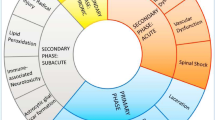Abstract
High-level spinal cord injuries are often associated with autonomic impairment, which can result in orthostatic hypotension and syncope. Persistent autonomic dysfunction can manifest with disabling symptoms including recurrent syncopal events. We describe a case of autonomic failure resulting in recurrent syncopal events in a tetraplegic 66-year-old man.



Similar content being viewed by others
Data availability
All relevant data related to this case are available as part of the article. Clinical data related to this case are retained by the medical records department at Royal Rehab, and are unavailable for release due to legislative requirements regarding patient confidentiality.
Change history
10 August 2023
In Table 1, Mental StressTest was corrected to Mental Stress Test.
References
Claydon VE, Steeves JD, Krassioukov A. Orthostatic hypotension following spinal cord injury: understanding clinical pathophysiology. Spinal Cord. 2006;44:341–51.
Canosa-Hermida E, Mondelo-García C, Ferreiro-Velasco ME, Salvador-de la Barrera S, Montoto-Marqués A, Rodríguez-Sotillo A, et al. Refractory orthostatic hypotension in a patient with a spinal cord injury: treatment with droxidopa. J Spinal Cord Med. 2018;41:115–8.
Ong ETE, Yeo LKP, Kaliya-Perumal AK, Oh JYL. Orthostatic hypotension following cervical spine surgery: prevalence and risk factors. Glob Spine J. 2020;10:578–82.
Krassioukov A, Eng JJ, Warburton DE, Teasell R. A systematic review of the management of orthostatic hypotension following spinal cord injury. Arch Phys Med Rehabil. 2009;90:876–85.
Jacob G, Robertson D, Mosqueda-Garcia R, Ertl AC, Robertson RM, Biaggioni I. Hypovolemia in syncope and orthostatic intolerance role of the renin-angiotensin system. Am J Med. 1997;103:128–33.
Mathias CJ. editor. Autonomic failure: a textbook of clinical disorders of the autonomic nervous system. 5th ed. Oxford: Oxford Univ. Press (Oxford Medical Publications); 2013. p. 897.
Shouman K, Vanichkachorn G, Cheshire WP, Suarez MD, Shelly S, Lamotte GJ, et al. Autonomic dysfunction following COVID-19 infection: an early experience. Clin Auton Res. 2021;31:385–94.
Austroads NTC and Assessing Fitness to Drive 2022. Austroads. https://austroads.com.au/publications/assessing-fitness-to-drive/ap-g56/blackouts/medical-standards-for-licensing. Accessed 1 Dec 2022.
Funding
No external funding was received for the production of this manuscript. LS and RH are both employees of Royal Rehab, which was not involved in the creation, content or decision to publish this manuscript.
Author information
Authors and Affiliations
Contributions
LS and RH were both involved in the clinical management of the patient’s care. LS authored the initial manuscript and RH provided a review and comments.
Corresponding author
Ethics declarations
Competing interests
The authors declare no competing interests.
Consent for publication
Informed consent was provided by the patient for publication of this case.
Additional information
Publisher’s note Springer Nature remains neutral with regard to jurisdictional claims in published maps and institutional affiliations.
Supplementary information
Rights and permissions
Springer Nature or its licensor (e.g. a society or other partner) holds exclusive rights to this article under a publishing agreement with the author(s) or other rightsholder(s); author self-archiving of the accepted manuscript version of this article is solely governed by the terms of such publishing agreement and applicable law.
About this article
Cite this article
Smith, L., Heriseanu, R. Recurrent syncope secondary to autonomic dysfunction in spinal cord injury: a case report. Spinal Cord Ser Cases 9, 23 (2023). https://doi.org/10.1038/s41394-023-00585-3
Received:
Revised:
Accepted:
Published:
DOI: https://doi.org/10.1038/s41394-023-00585-3
- Springer Nature Limited




